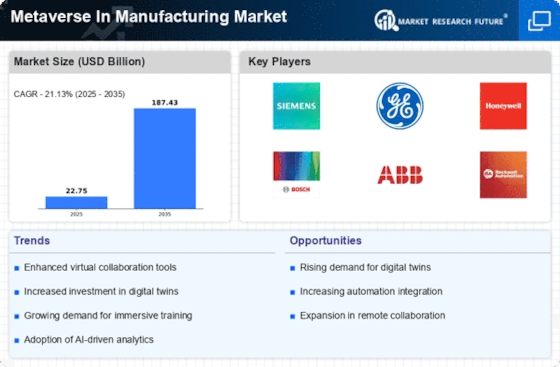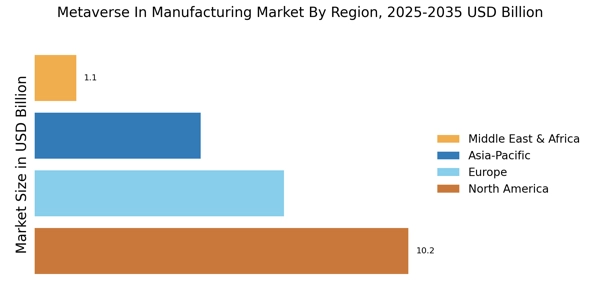Cost Reduction via Virtual Prototyping
Cost management remains a critical focus within the Metaverse In Manufacturing Market. Virtual prototyping allows manufacturers to create and test product designs in a digital space, significantly reducing the costs associated with physical prototypes. This approach can lead to savings of approximately 25% in development costs, as it minimizes material waste and accelerates the design process. As organizations strive to enhance their competitive edge, the adoption of virtual prototyping is expected to rise, further propelling the Metaverse In Manufacturing Market forward. The financial benefits associated with this technology are likely to attract more players into the market.
Integration of Supply Chain Management
The integration of supply chain management within the Metaverse In Manufacturing Market is emerging as a crucial driver. By utilizing virtual platforms, manufacturers can enhance visibility and collaboration across their supply chains. This integration allows for real-time data sharing and improved decision-making, which can lead to a reduction in lead times by approximately 20%. As companies seek to streamline operations and respond more effectively to market demands, the Metaverse In Manufacturing Market is expected to benefit from increased investments in supply chain technologies that harness the power of the metaverse.
Enhanced Training and Skill Development
The Metaverse In Manufacturing Market is also witnessing a transformation in workforce training and skill development. Immersive training programs utilizing virtual reality enable employees to gain hands-on experience in a risk-free environment. This method has been shown to improve retention rates by up to 70%, as workers engage more deeply with the material. As the manufacturing sector faces a skills gap, the demand for innovative training solutions is likely to increase. Consequently, the Metaverse In Manufacturing Market may see a surge in investments aimed at developing advanced training platforms that leverage immersive technologies.
Increased Efficiency through Simulation
The Metaverse In Manufacturing Market appears to be significantly influenced by the ability to simulate complex manufacturing processes. By utilizing virtual environments, manufacturers can test and optimize production lines without the risks associated with physical trials. This capability not only reduces downtime but also enhances overall productivity. According to recent data, companies that have integrated simulation technologies into their operations report efficiency gains of up to 30%. As manufacturers increasingly adopt these technologies, the Metaverse In Manufacturing Market is likely to experience substantial growth, driven by the demand for more efficient production methodologies.
Sustainability Initiatives and Environmental Impact
Sustainability is becoming a pivotal concern within the Metaverse In Manufacturing Market. Manufacturers are increasingly leveraging virtual environments to assess and minimize their environmental impact. By simulating production processes, companies can identify inefficiencies and implement greener practices, potentially reducing carbon footprints by up to 40%. As regulatory pressures and consumer expectations regarding sustainability rise, the Metaverse In Manufacturing Market is likely to evolve, with a growing emphasis on eco-friendly manufacturing solutions. This shift may drive innovation and attract investment in sustainable technologies.

















